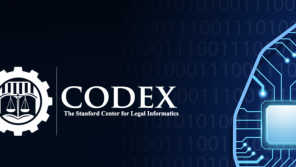AI has become an integral part of today’s developments and even everyday life. However, mastering it is not always as easy as it might seem – especially in the legal field – which is why, after intensive research, we have compiled a list of the 10 best AI training courses and platforms for lawyers, legal professionals and students. This list is supposed to help anyone interested in extending their knowledge about the workings of AI and its possibilities in the legal context.
1. CS50 for Lawyers by Harvard University
This course is a variant of Harvard University’s introduction to computer science, CS50, designed especially for lawyers (and law students). Through a mix of technical instruction and discussion of case studies, this course empowers students to be informed contributors to technology-driven conversations. In addition, it prepares students to formulate technology-informed legal arguments and opinions. Along the way, it equips students with hands-on experience with Python and SQL, languages via which they can mine data for answers themselves. Topics include algorithms, cloud computing, databases, networking, privacy, programming, scalability, security, and more, with a particular emphasis on understanding how the work developers do and the technological solutions they employ may impact clients. Students emerge from this course with a first-hand appreciation of how it all works and all the more confident in the factors that should guide their decision-making. This course takes place online and is free of charge, except for the certificate at the end.
2. Massive Open Online Course on AI and the Rule of Law by UNESCO
This free online course on AI and the rule of law, available in seven languages, features 20 speakers from around the world, including sitting judges from Supreme Courts and Human Right Courts, legal experts and technology experts. It features use cases and best practices from all over the world, including India, Brazil, Senegal, and Kenya. The course addresses two main issues: First, how judiciaries can use AI in their administrative work to strengthen access to justice and improve administrative processes; and secondly, how judiciaries can address issues of bias and discrimination in the use of AI, and the legal challenges it poses.
A certificate of completion will be awarded to all participants after they have completed all modules.
3. AI & Law by Lund University
This four-week course titled AI and Law explores the way in which the increasing use of artificially intelligent technologies (AI) affects the practice and administration of law defined in a broad sense.
Subject matters discussed include the connection between AI and Law in the context of legal responsibility, law-making, law-enforcing, criminal law, the medical sector and intellectual property law. The course aims to equip members of the general public with an elementary ability to understand the meaningful potential of AI for their own lives. The course also aims to enable members of the general public to understand the consequences of using AI and to allow them to interact with AIs in a responsible, helpful, conscientious way.
This platform offers a variety of courses, which interested parties may choose from. This allows for opportunities to learn not only about AI in the legal context, but also the general approach to it and how one should handle it, therefore providing a basic understanding, which can be essential for further learnings.
5. Artificial Intelligence: Business Strategies and Applications by Berkeley Executive
With advancements in machine learning, automation, and natural language processing, AI is revolutionizing traditional business models in unprecedented ways and is poised to drive a new wave of innovation and evolution across industries. AI offers a vast array of capabilities with virtually limitless potential, including automating repetitive tasks, providing predictive insights, enabling personalized customer experiences, optimizing supply chain management, and improving risk assessment. As AI continues to transform every aspect of modern business, organizations that embrace it will be empowered to unlock new opportunities, achieve operational efficiencies, and drive sustainable growth, gaining a competitive advantage.
For this course, a tuition fee of around US$2,800 will have to be paid.
What do lawyers and other professionals need to know about the technology underlying artificial intelligence (AI) and the mechanics of machine learning? How are companies actually using Artificial Intelligence in different products and services? What questions should lawyers, risk and compliance professionals, product managers, and others ask when confronted with AI systems that are making “decisions” that carry inherent risks? And how should organizations address the ethical issues raised by autonomous systems, such as data privacy, transparency, algorithmic fairness, and bias? This program answers these questions, among others, and will enable participants to more effectively advise their clients and serve as valued business partners within their organization.
The tuition fee to be paid for this course varies depending on the attending’s professional status and occupation.
7. AI for Decision Making: Business Strategies and Applications by Wharton Online
This program with Wharton Online is designed for participants seeking a competitive edge in business using AI. Learn how to leverage Big data, AI, & Machine Learning, and Gen AI to make better business decisions. The AI for Decision Making program will provide participants with the fundamentals of big data, AI, and machine learning and the various areas in which they can deploy these technologies to support their business.
The program fees for this course amount to about US$182 per month.
The European Information Technologies Certification Academy enables access to the European IT Certification standard for digital skills and IT competencies attestation. It is available online from Brussels, EU under a governance of the European Information Technologies Certification Institute (EITCI), a not-for-profit accreditation and certification authority for the programme that develops and disseminates it internationally. There are multiple courses to choose from, which aim at extending the participants’ general IT knowledge and skills.
The program fees for these courses vary. However, this project is subsidized in support of the European Commission Digital Skills and Jobs Coalition, which significantly reduces the fees.
9. Legal Tech and AI for Lawyers, law students and professionals by Udemy
This course will give you a comprehensive understanding of the ways in which technology is changing the legal industry and the role of the digital law professional in that landscape. It covers topics such as the use of legal software and applications, the role of artificial intelligence in the legal field, the impact of technology on the delivery of legal services, and the ethical considerations that arise in the use of technology in the practice of law. The course also discusses the skills and knowledge that a digital law professional should have in order to be effective in this rapidly evolving field. It is meant to ignite innovation and legalpreneurship and set you in the path of adding skills to succeed in this new age.
This course might be particularly interesting for law students because it is easily accessible and affordable.
10. Oxford Artificial Intelligence Programme
From algorithms to data analysis, AI is helping create efficient and smarter systems. Innovative technologies like generative AI and natural language processing are improving the way we do business, and now, technologies like these and others can be explored online in just six weeks. Now is the time to develop the foundational knowledge in AI so you can best leverage its capabilities to reach your professional goals and beyond. This programme does not require technical skills or the ability to code.
Concluding this list, anyone interested in further education on AI in the legal field should keep in mind that it is non-exhaustive. The variety of courses that are offered enables everyone who is interested to make a decision based on personal needs and areas of interest. Also, as AI is an especially dynamic and ever-developing field, the learning process should be continuous – you never stop learning.




